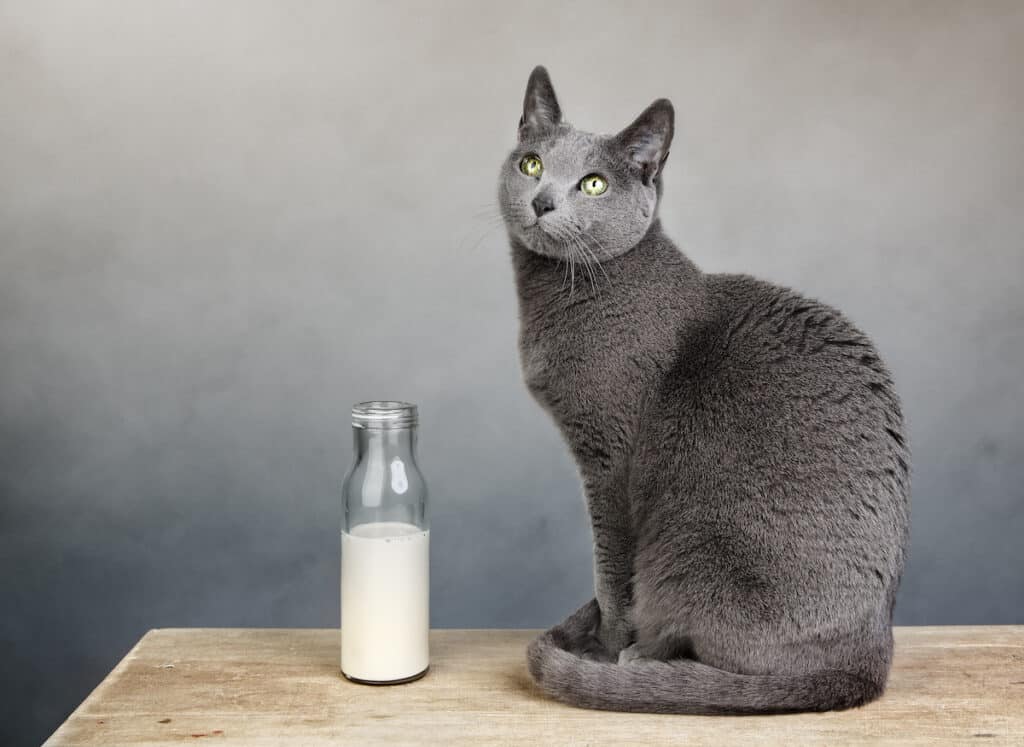The short answer to the question “can cats drink milk?” is no, they definitely should not drink milk. Cats are lactose intolerant, meaning they can’t process the lactose in milk. While your cat won’t be seriously harmed from drinking milk, they will experience a lot of discomfort.
Why Can’t Cats Drink Milk?
Most people think cats can drink milk because they absolutely love it. If you give your kitty a saucer of milk, she’ll happily lap it up. However, cats absolutely should not be given milk.
The reason cats cannot drink milk is that they’re lactose intolerant. This means cats can’t process the sugar lactose because they don’t have the lactase enzyme. As a result, the unbroken-down lactose causes bloating and sometimes even vomiting.
Why Are Cats Lactose Intolerant?
Cats are lactose intolerant for the same reason humans are. They don’t produce an enzyme called lactase that breaks down the sugar lactose. This enzyme is essential in digesting milk and other dairy products.
As such, the lactose just sits in the cat’s gut and doesn’t get broken down. Not only does this disrupt the digestive flow, but it also invites bacteria to grow.
Can Kittens Drink Milk?
Interestingly, kittens produce lactase, so they are actually not lactose intolerant. This is so that they can nurse on their mothers milk. While kittens can technically drink cow’s milk without the symptoms of lactose intolerance, they really shouldn’t be given milk.
Kittens have a very specific diet and nutritional needs as they’re growing. Cow milk doesn’t really offer much in the way of nutrition for kittens. In fact, milk is high in fats and sugars, which can lead to weight gain and obesity in cats.
Can Cats Eat Other Dairy Products?
For the same reason cat’s can’t drink milk, they also cannot consume other dairy products. Don’t let your cat fool you by begging for cheese or yogurt. You should not feed these items to a cat as they have lactose. Here is a list of other dairy products you can’t feed your cat:
- Cheese,
- Yogurt
- Cream
- Butter
- Buttermilk
- Curds
- Whey
What Happens if My Cat Drinks Milk?
While it’s probably not going to result in serious complications if your cat drinks milk, the symptoms are still unpleasant. The following are some symptoms of milk consumption in your cat:
- Diarrhea.
- Nausea.
- Vomiting.
- Stomach cramps.
- Bloating.
- Gas.
Can I Give My Cat Lactose-Free Milk?
Since we just explained that the reason cats can’t drink milk is because of their lactose intolerance, you may be wonder if your cat can consume lactose-free milk.
Many people who are lactose intolerant can drink lactose-free milk. However, while your cat won’t have the negative symptoms of lactose intolerance, milk is still not good for them.
Cats are obligate carnivores, which means they must eat meat to get the nutrients they need. Milk, on the other hand, is not a necessary part of their diet. Not only that, but milk is packed with sugar and fat, making it unhealthy for cats. Giving your cat lactose-free milk might just result in them gaining weight.














